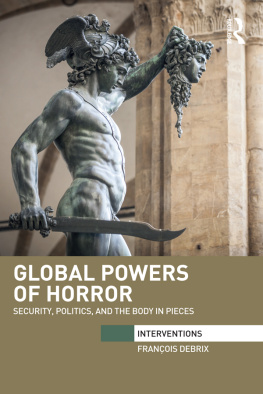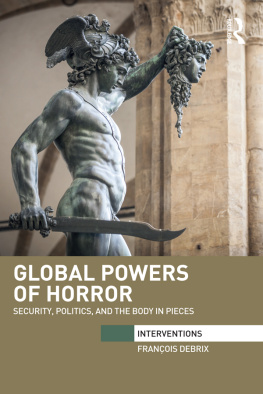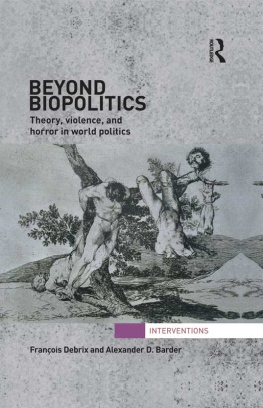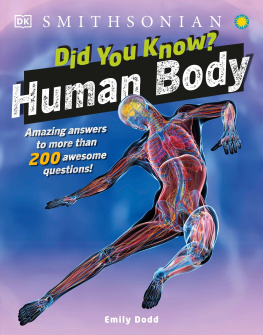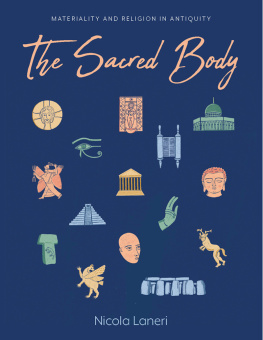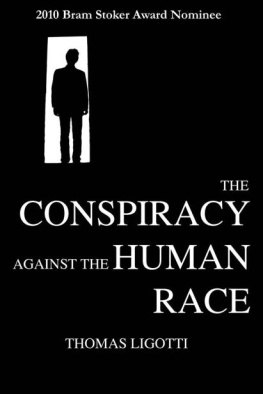First published 2017
by Routledge
2 Park Square, Milton Park, Abingdon, Oxon OX14 4RN
and by Routledge
711 Third Avenue, New York, NY 10017
Routledge is an imprint of the Taylor & Francis Group, an informa business
2017 Franois Debrix
The right of Franois Debrix to be identified as author of this work has been asserted by him in accordance with sections 77 and 78 of the Copyright, Designs and Patents Act 1988.
All rights reserved. No part of this book may be reprinted or reproduced or utilised in any form or by any electronic, mechanical, or other means, now known or hereafter invented, including photocopying and recording, or in any information storage or retrieval system, without permission in writing from the publishers.
Trademark notice: Product or corporate names may be trademarks or registered trademarks, and are used only for identification and explanation without intent to infringe.
British Library Cataloguing in Publication Data
A catalogue record for this book is available from the British Library
Library of Congress Cataloging in Publication Data
Names: Debrix, Franois, author.
Title: Global powers of horror: security, politics, and the body in
pieces/Franois Debrix.
Description: Abingdon, Oxon; New York, NY: Routledge is an imprint
of the Taylor & Francis Group, an Informa Business, [2017] |
Series: Interventions | Includes bibliographical references and index.
Identifiers: LCCN 2016037873 | ISBN 9780415741415 (hbk) |
ISBN 9780415741422 (pbk.) | ISBN 9781315725383 (ebk)
Subjects: LCSH: Biopolitics. | Human bodyPolitical aspects. |
Political violence.
Classification: LCC JA80.D44 2017 | DDC 320.01dc23
LC record available at https://lccn.loc.gov/2016037873
ISBN: 978-0-415-74141-5 (hbk)
ISBN: 978-0-415-74142-2 (pbk)
ISBN: 978-1-315-72538-3 (ebk)
Typeset in Bembo
by Sunrise Setting Ltd, Brixham, UK
In this brilliant provocation, Franois Debrix courageously calls us to shift our analyses from the body to body parts, and from terror to horror. Debrix tracks the horror of contemporary global politics in a number of settings, but also uses horror to put forth a most radical, and necessary, critical intervention against regimes of terror and security.
Brent J. Steele, University of Utah, USA
Human bodies litter the earth. Some obscured, some forgotten, some celebrated, some torn apart: these bodies have a physical, literal presence, a record of humanity written in flesh and bone. In Global Powers of Horror , Franois Debrix finally gives them the attention they deserve, tracing their political import and influence. The particularities of bodies, from the horrors of severed heads to the limits of embodied life, underpin our most resilient ideas about government, sovereignty, control, and discipline. Debrixs focus on this corporeal reality literalizes biopolitics and the topographies and theologies of life and death. It proves an essential guide to understanding the violence inherent to contemporary international politics.
Kennan Ferguson, University of Wisconsin-Milwaukee, USA
Interventions
Edited by Jenny Edkins, Aberystwyth University and
Nick Vaughan-Williams, University of Warwick
The Series provides a forum for innovative and interdisciplinary work that engages with alternative critical, post-structural, feminist, postcolonial, psychoanalytic and cultural approaches to international relations and global politics. In our first 5 years we have published 60 volumes.
We aim to advance understanding of the key areas in which scholars working within broad critical post-structural traditions have chosen to make their interventions, and to present innovative analyses of important topics. Titles in the series engage with critical thinkers in philosophy, sociology, politics and other disciplines and provide situated historical, empirical and textual studies in international politics.
We are very happy to discuss your ideas at any stage of the project: just contact us for advice or proposal guidelines. Proposals should be submitted directly to the Series Editors:
- Jenny Edkins (jennyedkins@hotmail.com) and
- Nick Vaughan-Williams (N.Vaughan-Williams@Warwick.ac.uk).
For a full list of available titles please visit www.routledge.com/series/INT The most recent titles in this series are:
Security without Weapons
Rethinking violence, nonviolent actions, and civilian protection
M. S. Wallace
Disorienting Democracy
Politics of emancipation
Clare Woodford
Democracy Promotion as Foreign Policy
Temporal othering in international relations
Cathy Elliott
Asylum Seekers, Sovereignty, and the Senses of the International
A politico-corporeal struggle
Eeva Puumala
Global Powers of Horror
Security, politics, and the body in pieces
Franois Debrix
Contents
This book started to take shape as I moved from Miami (FIU) to Blacksburg (Virginia Tech), back in 2011. Many of my colleagues at Virginia Tech have been strong supporters of this project, and I greatly benefitted from my conversations with them. I also had the chance to present a couple of this books chapters to them, often in the context of the ASPECT Working Papers series. First and foremost, I owe a debt of gratitude to my wife and beloved colleague, Clair Apodaca, and I thank her as always for her love and support. At Virginia Tech, I would like to thank Danna Agmon, Paul Avey, Gabriel Blouin Genest, Brian Britt, Mauro Caraccioli, Priya Dixit, Rohan Kalyan, Chad Lavin, Tim Luke, Michael Moehler, Wayne Moore, Madhavi Murty, Scott Nelson, Trish Nickel, Luke Plotica, Besnik Pula, Andy Scerri, Tamara Sutphin, Janell Watson, Edward Weisband, and Laura Zanotti. Their comments and suggestions, and their fostering of a theoretically rich and analytically critical intellectual environment at Virginia Tech, and within ASPECT in particular, are constant sources of encouragement. Doctoral students and scholars in the ASPECT program at Virginia Tech (a program I have been honored to direct since 2011) have been wonderfully clever, smart, inquisitive, and thought-provoking. Over the years, they have made ASPECT into a top-notch theory PhD program, and, through their engagement with my work and with theory more generally, they have pushed me to be clearer but also more daring about my thinking and my writing. This book owes a lot to their passion and intellectual honesty. In particular, I would like to thank the terrific discussions, during and outside graduate seminars, on matters of biopolitics, thanatopolitics, the body, terror/terrorism, horror, ideology, critical geopolitics, critical international relations theory, security politics, postcoloniality, postmodernity, visual media and culture, and theory in general that I have had with Judson Abraham, Caroline Alphin, Ryan Artrip, Seth Bartee, Amiel Bernal, Katie Cross, Rikky Curtis, Claudio DAmato, Komal Dhillon, Taulby Edmondson, Sascha Engel, Tim Filbert, Johannes Grow, Darren Jackson, Eli Jamison, Holly Jordan, Jordan Hill, Mario Khreiche, Jordan Laney, Jenn Lawrence, Christian Matheis, Kent Morris, Mohammed Pervaiz, Francine Rossone de Paula, Mary Ryan, Jamie Sanchez, Melissa Schwartz, Aaron Stoller, Alex Stubberfield, Tyler Suggs, Anthony Szczurek, Josette Torres, Shelby Ward, and Mike Zarella. Likewise, many friends and colleagues across the profession have been enormously generous with their time. They have offered comments on chapters or sub-sections of chapters at conferences, while serving as discussants on panels, as a result of invited lectures, or through many informal conversations. For this project, I have gathered important feedback through various discussions and conversations with Jack Amoureux, Kellan Anfinson, Alex Barder, Tom Beaumont, Jane Bennett, Peter Burgess, Elisabeth Chaves, Mat Coleman, William Connolly, Joel Crombez, Miguel de Larrinaga, Jenny Edkins, Clara Eroukhmanoff, Kennan Ferguson, Simon Glezos, Harry Gould, David Grondin, Jairus Grove, Renee Heberle, Nick Kiersey, Mark Lacy, Daniel Levine, Mike Lipscomb, Georg Lfflmann, Ben Meiches, Himadeep Muppidi, Dan berg, Sam Opondo, Mat Paterson, Mark Rigstad, Andrew Ross, Sayres Rudy, Mark Salter, Nisha Shah, Sarah Sharma, Mike Shapiro, Joel Shelton, William Sokoloff, Ty Solomon, Vicki Squire, Brent Steele, Simon Stow, Alex Struwe, Nick Vaughan-Williams, Antonio Vasquez-Arroyo, Inna Viriasova, Cindy Weber, Jason Weidner, Geoffrey Whitehall, Yoshiko Yamada, and Andreja Zevnik. I am very grateful to the Department of Politics and International Studies at the University of Warwick, the School of Political Studies at the University of Ottawa, and the Institut fr Politikwissenschaft at TU Darmstadt for their generous invitations to present early versions of some of this books chapters. Finally, I am thankful to Jenny Edkins and Nick Vaughan-Williams, the Interventions series editors, and Lydia de Cruz and Nicola Parkin, the editors at Routledge, for their patience and their continued support over the years.

